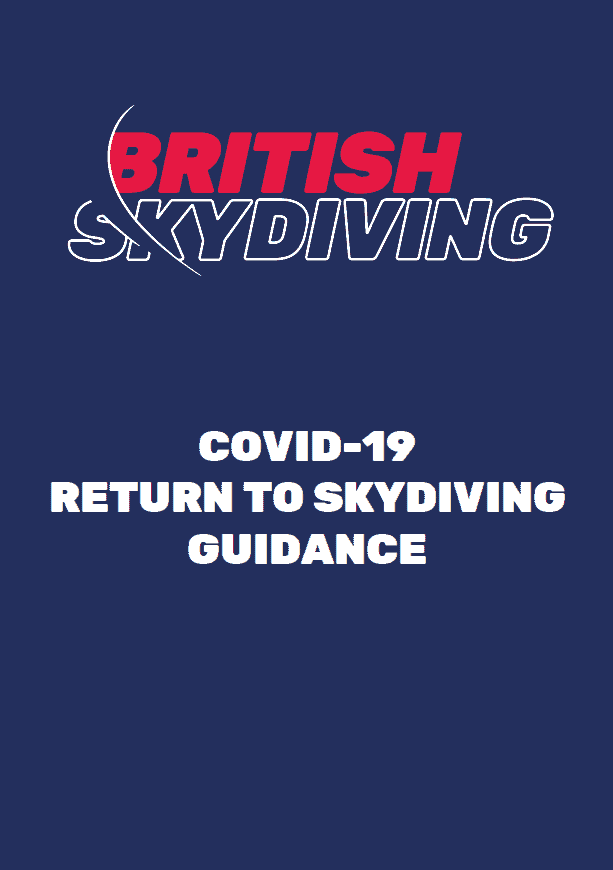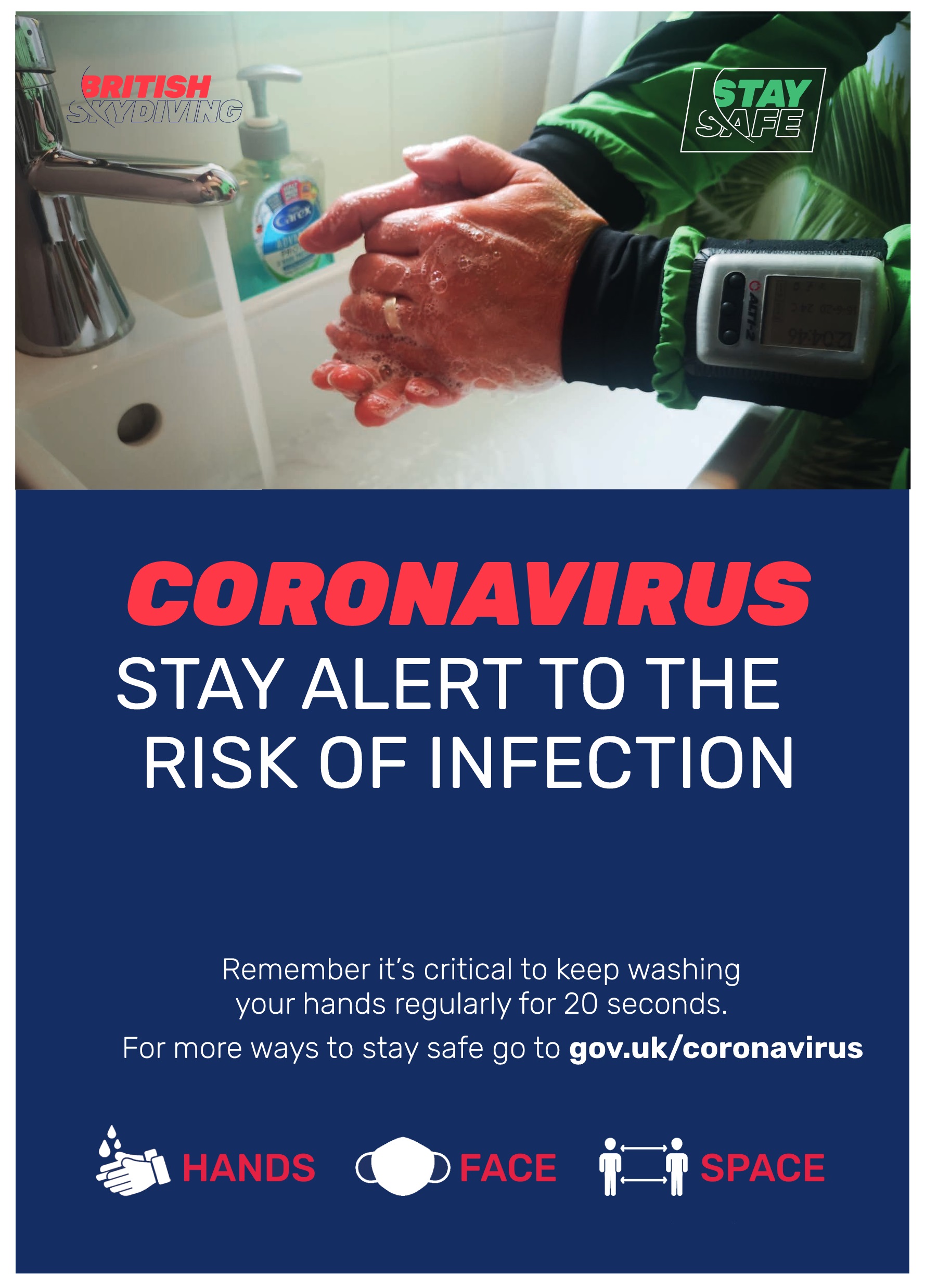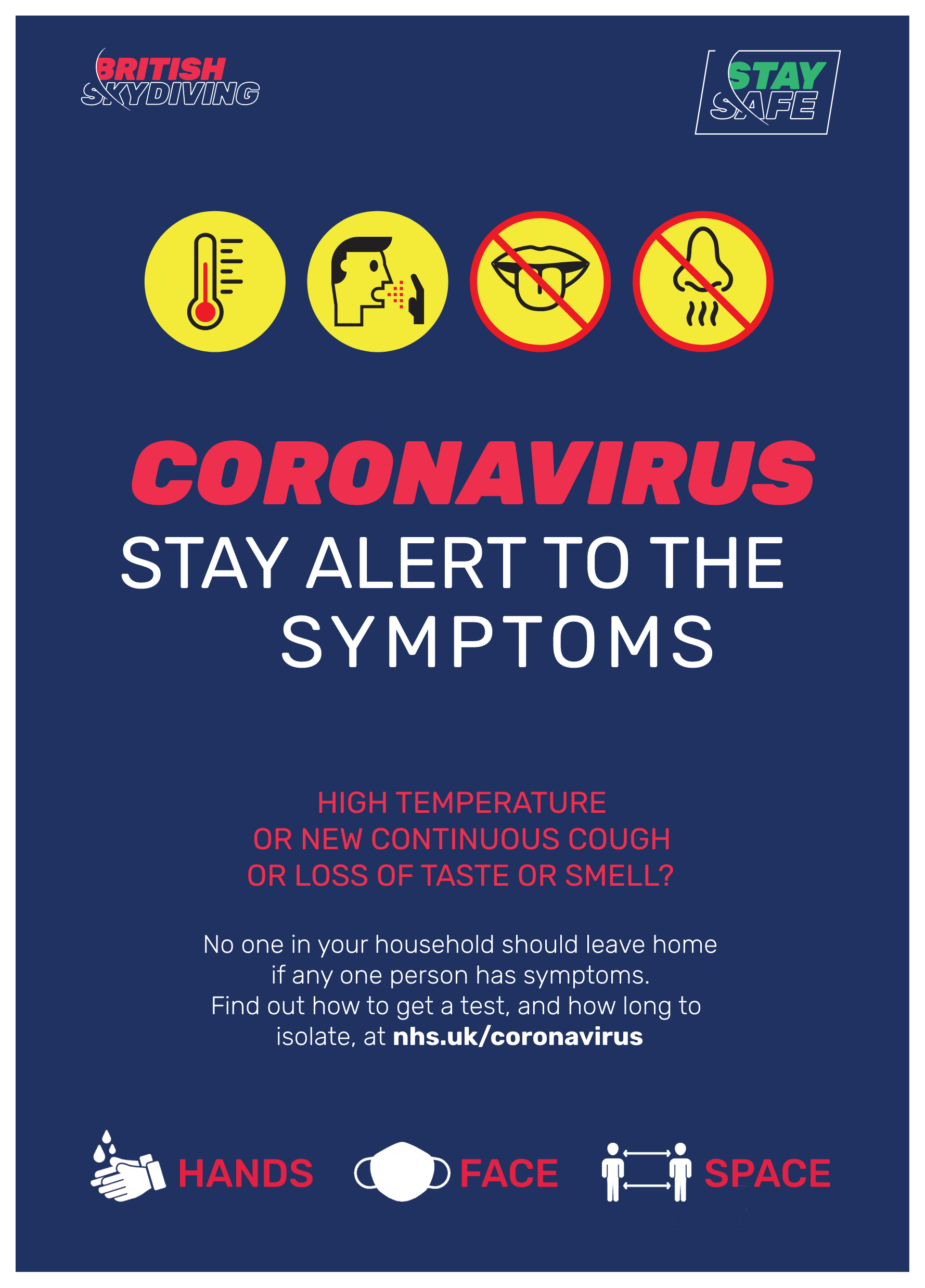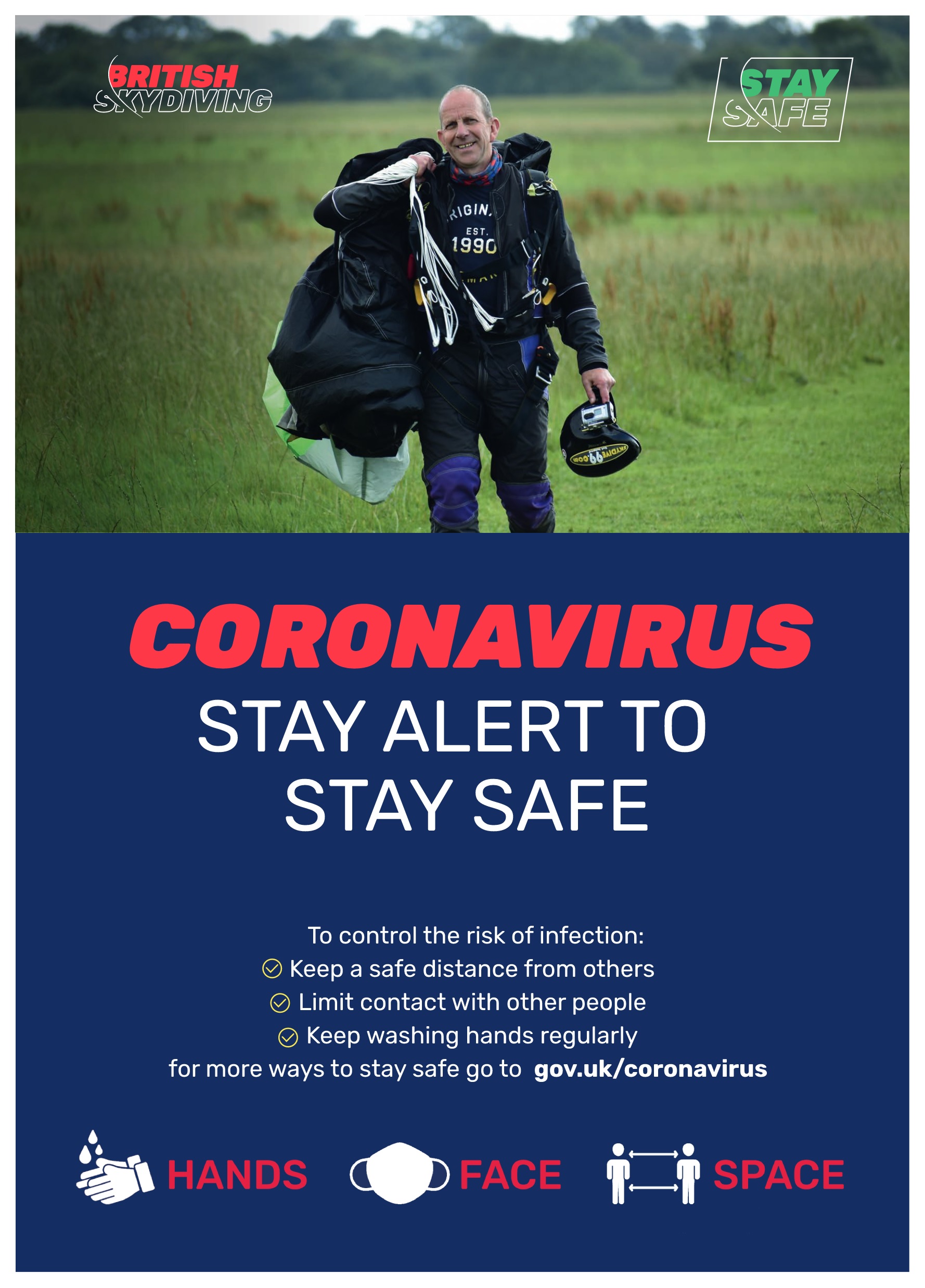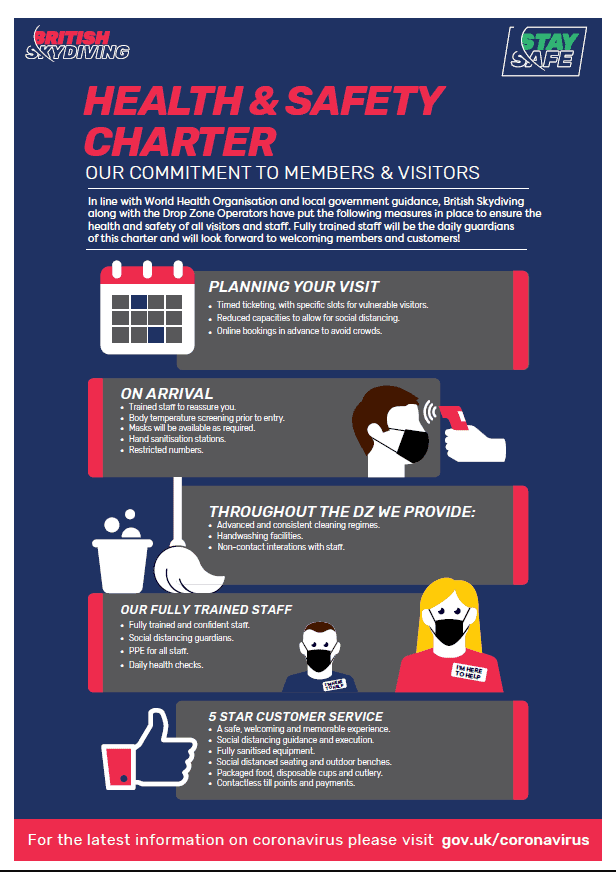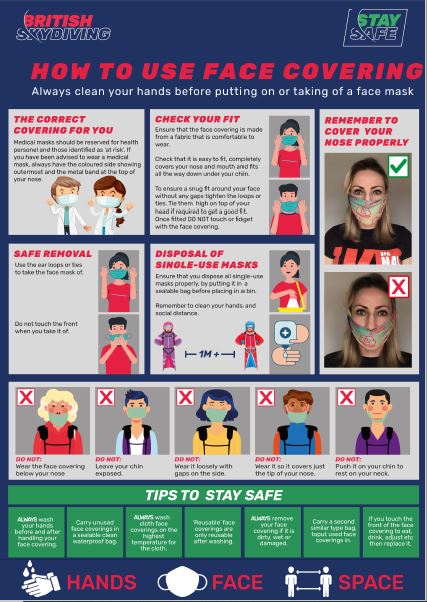FURTHER COVID ADVICE FOR DROP ZONES
With Coronavirus currently affecting about 1 in every 65 of all people in England and an even higher incidence in the younger, more active, less vaccinated populations, it is no surprise that some DZs have had cases amongst their staff and regular jumpers.
Nearly everyone understands the need for the affected person to self-isolate. Not everyone is fully aware of when testing can or should be done, when contacts of a first case should self-isolate, what is meant by “close contact” or who is obliged to tell whom.
Symptoms
There are few people who are unaware of the classical symptoms of coronavirus infection (fever, persistent dry cough, loss of sense of taste or smell). However, other symptoms are now appearing more commonly, particularly with some new variants in younger people. Persistent runny nose, headache, sore throat and diarrhoea can also be relevant symptoms – do not be tempted to hope it is just hayfever or a cold – get tested.
Testing
Self-administered Lateral Flow Tests (LFTs) give results in 30 minutes and are useful as a screening measure performed 2-3 times a week amongst all staff. It is considerate for any skydiver to be doing similar screening before getting in an aircraft with their fellow skydivers. LFTs are available free of charge to anyone from many local pharmacies and can be ordered online for postal delivery (Order LFT). They are not particularly sensitive and are not reliable enough to use if you think you have symptoms of coronavirus. The results of self-administered LFTs should be recorded on-line on the day you do them, especially if one is positive (Report Result).
If you have a positive LFT or think you may have symptoms of coronavirus, you should arrange a more sensitive and reliable Polymerase Chain Reaction Test (PCRT) to obtain formal confirmation. If you have a single positive LFT, do not be tempted to keep repeating it in the hope of getting a “reassuring” negative result – you need to self isolate for the time being, report the positive test and get a PCRT. PCRTs have to be sent to a lab for processing so inevitably take longer to get results. Free PCRTs can be booked through Book PCRT .
If you believe that you are a contact of someone with COVID-19 but have not yet been notified by NHS Test and Trace, you should carefully follow the guidance on how to stay safe and prevent the spread of COVID-19. In this circumstance you can arrange to take a PCR test, even if you do not have symptoms, because you may be at higher risk of being infected (No symptoms but risk of infection).
Contacts at Risk of Infection
Relatively little contact is required for a significant risk of infection. See “Close Contacts” in the Employers section further below for a detailed list. These definitions still apply even if you were wearing a face covering. Only medical grade PPE used in hospitals/health care settings alters the assessment.
Communication
Communication about positive results is really important. We never know which of our skydiving colleagues may have significant health issues putting them at more risk or who may have relatives at home who are at increased risk.
An individual with a positive test may have feelings of guilt about contacts in the last few days and so be reluctant to declare it. Simply having coronavirus is not a reason to feel guilty – failing to declare it is another matter altogether. Affected individuals may also be anxious about formally reporting a positive test to the health or government systems. An employer may be concerned about effects on the viability of their business following reporting of a positive result (both in terms of reputation and in terms of remaining staff continuing to work). However, once you have contacted NHS Test and Trace or your local Health Protection Team, they should arrange necessary testing or isolation with contacts without naming the source of an infection. Not communicating adequately about a case at the DZ just risks a more widespread outbreak at the DZ with health, reputational and financial consequences.
Many instructors, pilots, coaches and recreational jumpers attend more than one DZ. Lack of open communication about cases on a DZ make it easier for these travellers to unintentionally spread infection to other PTOs.
Regardless of any legal requirements to isolate or report results or contact health authorities (see below), we have a duty to look after each other. Let’s make sure we all try to do that.
Advice for Employers
The following advice for employers is taken from the website https://www.gov.uk/guidance/nhs-test-and-trace-workplace-guidance
Ensuring your workers self-isolate where necessary
It is an offence for you (as an employer) to allow a worker to attend the workplace if you are aware that the worker has either:
- tested positive for COVID-19
- been in close contact with someone who has tested positive for COVID-19 and received a notification to self-isolate from NHS Test and Trace, unless they are participating in an approved daily contact testing scheme
This NHS guidance explains how long an individual must self-isolate for.
If you know that a worker has been told to self-isolate by NHS Test and Trace, you must not allow them to come into work or work anywhere other than where they are self-isolating (usually, their home) for their full self-isolation period, unless they are participating in an approved daily contact testing scheme (these schemes are not available to DZs!). Failure to do so could result in your firm facing a fine, starting from £1,000.
If a worker has received a notification to self-isolate via the NHS COVID-19 app, they should not attend the workplace as the individual may be infectious and could spread the virus, unless they are participating in an approved daily contact testing scheme.
In certain limited circumstances fully vaccinated employees identified as contacts may be able to leave self-isolation to undertake critical work (this does not apply to DZs). Further detail is set out below.
Close contacts
A close contact is a person who has been close to someone who has tested positive for COVID-19. You can be a contact anytime from 2 days before the person who tested positive developed their symptoms, and up to 10 days after. This is when the virus can be passed to others.
A risk assessment may be undertaken to determine this, but a contact can be:
- anyone who lives in the same household as another person who has COVID-19 symptoms or has tested positive for COVID-19
- anyone who has had any of the following types of contact with someone who has tested positive for COVID-19:
- face-to-face contact including being coughed on or having a face-to-face conversation within one metre
- been within one metre for one minute or longer without face-to-face contact
- been within 2 metres of someone for more than 15 minutes (either as a one-off contact, or added up together over one day)
A person may also be a close contact if they have travelled in the same vehicle or plane as a case.
See guidance for non-household contacts.
NHS Test and Trace will not usually consider someone to be a contact if their interaction with a positive case took place through a Perspex (or equivalent) screen as long as there has been no other contact such as those in the list above.
The wearing of personal protective equipment (PPE) will not be considered as a mitigation when assessing whether a recent contact is likely to have transmitted the virus. Only full medical-grade PPE worn in health and care settings will be considered.
If any of your workers test positive
Employers should call the Self-Isolation Service Hub on 020 3743 6715 as soon as they are made aware that any of their workers have tested positive.
Employers will need to provide the 8-digit NHS Test and Trace Account ID (sometimes referred to as a CTAS number) of the person who tested positive, alongside the names of co-workers identified as close contacts. This will ensure that all workplace contacts are registered with NHS Test and Trace and can receive the necessary public health advice, including the support available to help people to self-isolate.
In the event of an outbreak in the workplace, employers should contact their local Health Protection Team.
Dr John Carter
British Skydiving Medical Advisor

